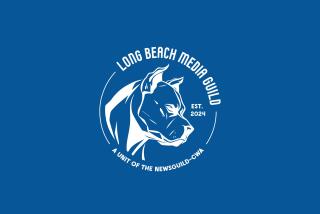2 former top execs of OC Register owner seek $4.5 million in severance
Two former top executives have sued Freedom Communications Inc., owner of the Orange County Register, saying the company has failed to pay them a combined $4.5 million in severance pay.
Mitchell Stern, Freedom’s chief executive from 2010 to 2012, and Mark McEachen, its chief financial officer during that time, stayed with the company after it was acquired by entrepreneur Aaron Kushner in July 2012.
The executives said in an arbitration filing that they agreed to postpone their severance payments — $3.3 million to Stern and $1.2 million to McEachen — because of the company’s “precarious finances.” Freedom fired them in June but has refused to make good on its promise to pay their deferred severances, they said.
In September, Stern and McEachen filed a petition in Los Angeles County Superior Court seeking to place a $4.5-million lien against Freedom’s assets, a step that would help them collect any money they are awarded in arbitration.
Jeffrey B. Valle, the executives’ attorney, said plaintiffs typically seek such liens when there are questions about a company’s financial health. He declined to discuss Freedom’s financial condition.
Kushner said in a statement that the company intends to vigorously defend itself, calling the executives’ claims “groundless and without merit.” He said Freedom “has asserted clear claims against the former executives based on misconduct before the sale of the newspaper business.”
He also said there is no cause for concern about the company’s finances.
“Freedom Communications is in strong financial condition with strong financial partners,” Kushner said in the statement.
Since acquiring the Register, Kushner has bucked an industry-wide trend of downsizing at U.S. newspapers, doubling the newspaper’s staff of reporters and editors, adding weekly sections and launching a new newspaper in Long Beach.
Although many publishers have placed a new emphasis on their digital businesses, in some cases cutting back home delivery, Kushner has added pages and placed a priority on print.
Kushner has said the company is profitable but has declined to provide details. In August, he told employees that the company’s financial performance fell short of expectations in the second quarter. In January, the company stopped matching employees’ 401(k) contributions.
The newspaper industry has watched the changes at the Register with both skepticism and hope, said Alan D. Mutter, a professor of media economics and entrepreneurship at UC Berkeley’s Graduate School of Journalism.
“I know no other publisher in the United States who has been as aggressive as Mr. Kushner in adding staff, adding sections, adding pages and even launching new editions,” Mutter said.
“The questions a lot of us have, without knowing the internal economics of the business, is: Is he making money? Is he breaking even? Is he losing money, but hopes that losing money today leads to a better future?”
The fact that the former executives would seek to attach Freedom’s assets is not necessarily a sign that the company is struggling, said attorney Alan Greenberg, co-founder of the Costa Mesa law firm Greenberg Gross, which is not involved in the case.
“So far they have not presented any evidence of any insolvency or reason to believe [Freedom] would be unable to pay a judgment,” Greenberg said. “Just because they filed it doesn’t mean that they don’t have the wherewithal to pay.”
Valle said the executives intend to examine the Register’s finances through the legal process, a move he said could help them support their case to attach Freedom’s assets.







